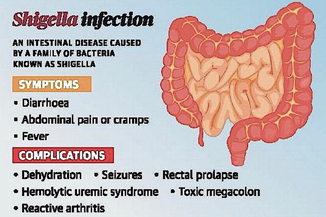

Context
The Kerala health department recently identified Shigella bacteria as the cause for the food poisoning incident in Kasaragod, which claimed the life of a 16-year-old girl and led to 30-odd others being admitted to hospital.
About
What is Shigella?
- Shigella is a bacterium that belongs to the enterobacter family — a group of bacteria that reside in the intestine, not all of which cause disease in humans.
- It mainly affects the intestine and results in diarrhoea, sometimes bloody, stomach pain, and fever.
- The infection spreads easily as it takes only a small number of bacteria to make someone ill.
- It is a food- and water-borne infection, and can happen when someone consumes contaminated food.
- The disease is easily spread by direct or indirect contact with the excrement of the patient.
What are the symptoms?
- Diarrhoea (often containing blood or mucous)
- Stomach pain or cramps
- Fever
- Nausea or vomiting
How widespread is Shigella infection?
- Shigellosis happens, but it is not a very common infection.
- Shigella outbreaks appear to be exacerbated during pregnancy and in children less than five years of age, and in those with weakened immune systems.
- There are four types of Shigella bacteria that affect humans — Shigella sonnei, Shigella flexneri, Shigella boydii, and Shigella dysenteriae.
- The fourth type causes the most severe disease because of the toxin it produces.


